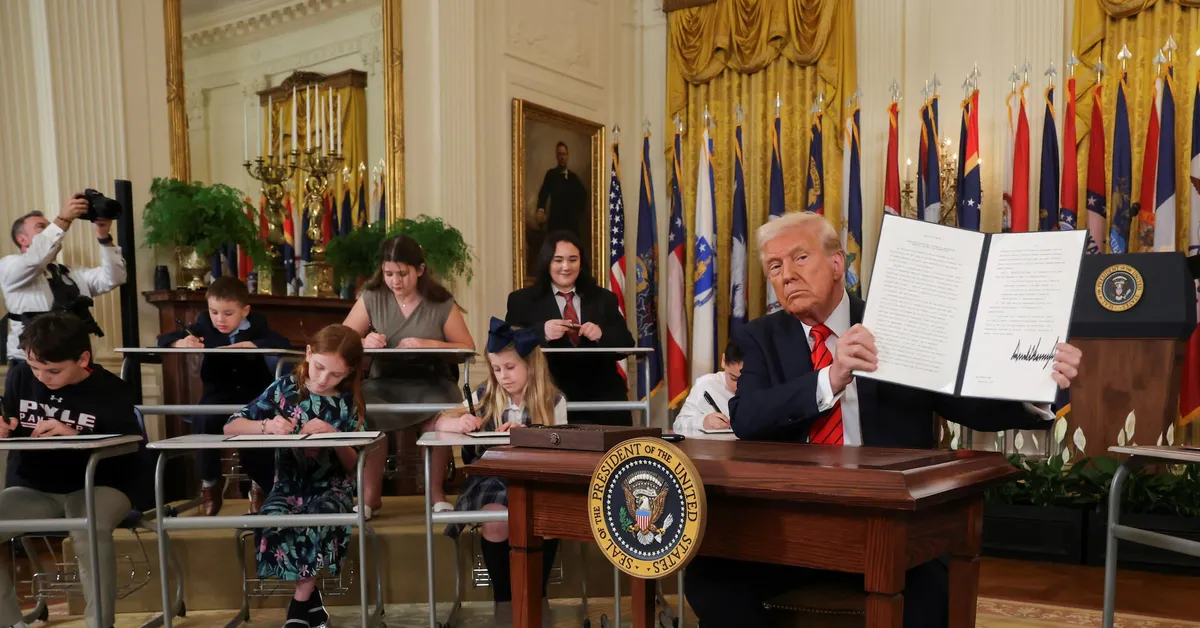
On March 20, 2023, U.S. President Donald Trump made headlines by signing an executive order that seeks to effectively dismantle the federal Department of Education. This significant move comes as part of Trump's longstanding commitment to conservative education policies and has stirred considerable debate among educators and policymakers alike. During the signing ceremony held in the East Room of the White House, Trump was surrounded by students and educators, emphasizing the importance of this decision.
The newly signed executive order aims to transfer control of education policy from the federal government to individual states and local school boards. This shift has raised alarms among liberal education advocates, who fear that it may lead to disparities in educational quality and access across the country. "We're going to be returning education, very simply, back to the states where it belongs," Trump stated, highlighting his administration's vision for education reform.
While the executive order initiates the process of reducing the Department of Education's influence, Trump acknowledged that completely abolishing the department would require an act of Congress, a feat he currently lacks the support to accomplish. Last week, the Department of Education announced plans to lay off nearly half of its staff, indicating a significant restructuring of the agency.
Education in the United States has long been a contentious political issue. Conservatives typically advocate for school choice initiatives that favor private educational institutions, while progressive voters predominantly support public school funding and programs. The divide over educational policies intensified during the coronavirus pandemic, with Trump leveraging this discord during his presidential campaign.
As part of his educational strategy, Trump has tasked Education Secretary Linda McMahon with streamlining the department to focus solely on essential functions, such as administering student loans and Pell Grants, as well as providing resources for children with special needs. "We're going to shut it down and shut it down as quickly as possible," Trump proclaimed, criticizing the department's effectiveness.
Despite Republican control of both chambers of Congress, Trump will need bipartisan support to fully dismantle the Department of Education. Democratic leaders, such as U.S. Senator Patty Murray, have expressed skepticism regarding the executive order's legality and efficacy. Murray articulated concern, stating, "Donald Trump knows perfectly well he can’t abolish the Department of Education without Congress." Meanwhile, Randi Weingarten, head of the American Federation of Teachers, has vowed to challenge any efforts to undermine the department.
Polling data suggests that a majority of Americans oppose the closure of the federal education department. A recent Reuters/Ipsos poll indicated that approximately 65% of respondents disapproved of the plan, underscoring the public's preference for maintaining federal support for education.
Federal aid constitutes a significant portion of funding for K-12 education, accounting for 15% of total revenue in states that supported Trump in the 2024 election. This aid is crucial for low-income schools and students with special needs, two key demographics that rely heavily on federal programs. Notably, proposals to redirect these funds to private schools have faced substantial opposition, even among Republican lawmakers.
As the Trump administration moves forward with its plans, the future of the Department of Education remains uncertain. The implications of this executive order are likely to be felt across the educational landscape, impacting students, teachers, and educational institutions nationwide.